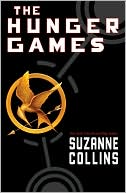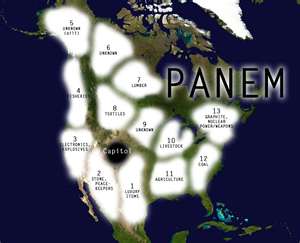

This is Round One. We’ll have another round of discussion next Thursday. And on Friday, Emily will review the movie! (And lest you’re thinking we’ve become all HG all the time, I’m hoping to start a new feature tomorrow: Saturday Reviews of noteworthy new books.)
We’ll start off with a general question: What do you find most compelling about the Hunger Games trilogy? What do you see as the major theme?
Caity:
I read The Hunger Games as a commentary on my generation (an overlap between Generation Y and Z) as well as an indictment against the culture in which we live. Since birth we members of the current generation have been inundated by an endless stream of sex, violence, and advancing technology. We are desensitized. Nothing can shock us. We’ve seen it all already: every form of gruesome death, most sexual acts, all forms of religion, and whatever else we want can be called up instantaneously on our smart phones. The Hunger Games is an illustration of what a culture made up of desensitized individuals looks like. Katniss, while serving as the protagonist, also represents someone coming from an amoral culture such as the one from which my generation has grown. Everything/one around Katniss tells her that the only way to make things better is to perform in the Arena, the only way to survive is to kill others. How is she to know any differently? She cannot, yet there is something inherently present within her, telling her that something is amiss. Ultimately, she acts on this gut instinct in an attempt to overthrow the Capital and wake the Districts out of their stupefaction.
Morgan:
The primary reason that I’ve lost my taste for fairy tales has nothing to do with the color pink, castles or princesses. Rather, the universes they inhabit are characterized by clear heroes and villains, decisions that are noble or nefarious and choices, if the character stays pure in heart, that ensure everyone lives happily ever after. In Susan Collins’ The Hunger Games trilogy, nothing is that simple or guaranteed and everything bears much more resemblance to reality.
Katniss, rather than a charismatic and warm person who immediately merits my affection, instead had me bristling at her hostile and distrusting attitude in the first few chapters. While her motivations for sneaking out behind the fence and poaching–and then later courageously taking her sister’s spot in the tournament–appear selfless enough, there is a layer of resentment, fear and coldness in her personality that does not make me want to hug her–and even less to cross her. I found myself feeling bad when Peeta announced his love for her—she, of all people at that time, does not deserve him. (Does she ever?)
Yet there is something so gripping about Katniss’ refusal to be tamed, and about the unstable and predatory world she inhabits, that I found myself stranded in Panem for several days while reading through the series. I believe this has to do with the overwhelming aura of moral ambiguity of the books. In many books, I can make an educated guess about what I predict will happen and a normative judgment what I believe ought to happen. In The Hunger Games , I often found myself doing the former—rarely was I able to answer the latter. In a context where kids (and the audience for that matter) are forced to forget their humanity and kill or be killed, how can I even begin to offer up any sort of value statement? Indeed, I feel that the absence of any sort of sophisticated morality is one of Collin’s strongest themes in the book.
In the arena, any extension of support or fidelity, any relationship, really, has only one end—exploitation. Any alliance must 

A question for Caity: I’m intrigued by your comment about the desensitization of culture. As you talk about the book with your friends, do you get the same sense from them? Is there a resolve to do something about it, or a helpless feeling that this is just the way things are?
In talking to my friends who have read The Hunger Games, most of them have not thought about the book very deeply. They simply enjoy the action, the twists and turns. Maybe this proves my point: we’ve been taught not to think too deeply when it comes to what we find entertaining. In discussing the novels with my campus minister, he agreed that this rising culture of desensitization is a major theme within the trilogy. As Christians, there should always be a resolve to engage culture at large and my friends definitely recognize and accept that challenge. Yes, we are all getting our degrees in order to live the dream – have a family and career and whatnot – but, in my social circle, our larger purpose in getting a degree and having a successful career is to bring the Kingdom into the world in which we live. Our goal is to be the best in our respective fields on order that the world will see our spark and “catch fire,” just as the Districts do in The Hunger Games. In that respect, I view Katniss as a redemptive character. Is she a product of her violent and depraved culture? Yes. Aren’t we all? Yet, Katniss engages and challenges the cultural norms in order to fight off injustice and darkness and bring about freedom. I’m not saying that these parallels are blatant, but when reading through the lens of a Christian worldview, shouldn’t we always be seeking out redemption?
A question for Morgan: I’ve read that one of the great values of fiction is helping the reader sort out right from wrong in an experimental context—to try on different situations and question how he or she would respond. Do you feel the story gives you any guidance in the area of moral choice, or does the author sort of leave you on your own to work it out?
There are a large number of my peers who see themselves as victims of circumstances and schemes. They regularly use language to describe themselves and their lives that makes them seem more like modeling clay than protagonists. Everything can be blamed (rarely do they credit) on spontaneous calamities and manipulative friends and whoops! they got confused or lost control or forgot about the time. Morality? That’s the luxury of the proactive, who wield power over their lives, if only because they understand their own agency—that is, they realize they always have a choice.
Suzanne Collins reminds her readers in The Hunger Games that individuals can freely act on a situation and are not a slaves to circumstance—regardless of just how narrowly defined these contexts can be. She tests this hypothesis in the arena where the gamekeepers force kids to kill or be killed and punish apprehension with monstrous creatures and artificial disasters. Ironically, throughout the story, Katniss and Peeta resist engaging the capital’s barbarisms, recognize their agency and instead act in a way that shows life’s sacredness. It is difficult to extrapolate any obvious morality from the books, if only because the extremity of environment does not compare easily to the modern world. Certainly courage is a plus and selflessness lauded. But these are the morals of any hero tale. Instead, Collins suggests Gandalf’s words to Frodo in the dark mountains of Moria, “All we have to decide is what to do with the time that is given us.” No matter how twisted the world has become, we still have freewill. We still have a choice.
Thanks, guys! We’ve talked a lot of about darkness and ambiguity–next week, we’ll try to look at the case for optimism. And now, how about you, reader? Agree or disagree? Something to think about, or are we reading too much in or out?
Stay Up to Date!
Get the information you need to make wise choices about books for your children and teens.
Our weekly newsletter includes our latest reviews, related links from around the web, a featured book list, book trivia, and more. We never sell your information. You may unsubscribe at any time.
Support our writers and help keep Redeemed Reader ad-free by joining the Redeemed Reader Fellowship.
Stay Up to Date!
Get the information you need to make wise choices about books for your children and teens.
Our weekly newsletter includes our latest reviews, related links from around the web, a featured book list, book trivia, and more. We never sell your information. You may unsubscribe at any time.
FREE Bible Guide!
Get a guide to the Best Bibles for Children and Teens. Perfect for an Easter gift.
We'd love to hear from you!
Our comments are now limited to our members (both Silver and Golden Key). Members, you just need to log in with your normal log-in credentials!
Not a member yet? You can join the Silver Key ($2.99/month) for a free 2-week trial. Cancel at any time. Find out more about membership here.
3 Comments
Leave a Comment
You must be logged in to post a comment.


I’m so impressed by your thoughtfulness, ladies. Several of your points have been ringing in my head all day. I’m still chewing on the story itself, so I don’t have much to add at this point, but it’s fascinating to hear your takes. Thanks for letting me in on your thoughts!
Thanks for this thought-provoking post. As we’re reading through book 1, it gives food for thought and discussion.
Wonderful insights. One thing I do want to point out about fairy tales. I believe their purpose is not so much to reflect the world around them but rather to point to moral truth. This is why they remain timeless (although unfortunately not taught like they once were.) So could we, absent of the truth taught in fairy tales (or by extension, even in a household of faith, accurately discern moral ambiguity? I don’t think so.
Collins’ series can and mostly is enjoyed on a purely surface level for the story. How wonderful to see these young women look deeper! Off to read the rest of the conversation.